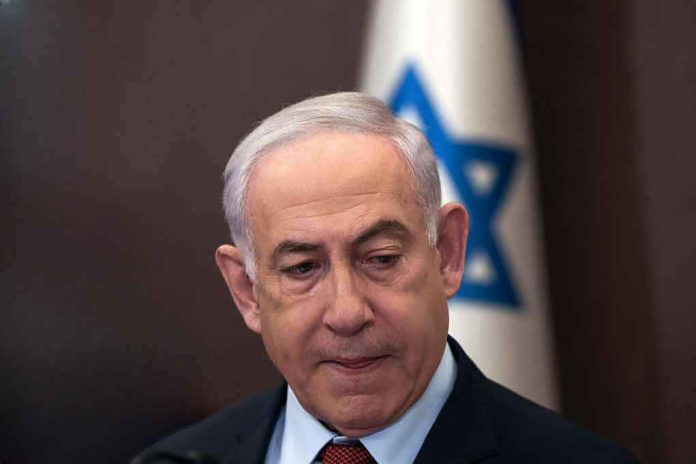
Netanyahu’s rejection of Palestinian statehood challenges diplomatic norms, reigniting international debate.
Story Snapshot
- Netanyahu firmly opposes a Palestinian state west of the Jordan River.
- UK, Australia, and Canada’s recognition of Palestine prompts Israeli backlash.
- Potential Israeli annexation of West Bank territories looms.
- Diplomatic tensions rise between Israel and Western allies.
Netanyahu’s Firm Stance on Palestinian Statehood
On September 21, 2025, Israeli Prime Minister Benjamin Netanyahu declared there would be no Palestinian state west of the Jordan River, responding to the UK, Australia, and Canada’s recent recognition of Palestinian statehood. This statement marks a significant escalation in Israel’s diplomatic relations with these Western nations. The announcement was made shortly after Netanyahu’s press conference with U.S. Secretary of State Marco Rubio, where he reiterated Israel’s longstanding opposition to Palestinian statehood.
Netanyahu’s comments indicate a potential shift in Israeli policy, with Israeli officials considering the annexation of parts of the West Bank as a countermeasure. This development comes amid ongoing debates over the Israeli-Palestinian conflict, with international stakeholders divided over the best path forward. The recognition of Palestinian statehood by these Western countries represents a departure from their traditional support for Israel, reflecting growing frustration over stalled peace negotiations.
International Reactions and Diplomatic Tensions
The recognition of Palestinian statehood by the UK, Australia, and Canada has strained diplomatic relations with Israel. Netanyahu’s public rebuke of these Western allies underscores the tensions. Israeli UN Ambassador Danny Danon criticized the recognition, describing it as a “circus.” Meanwhile, Western governments have reaffirmed their support for a two-state solution, advocating for renewed negotiations between Israel and Palestine.
Despite the rising diplomatic tensions, there has been no immediate change on the ground. However, the situation remains volatile, with heightened rhetoric and potential policy shifts on the horizon. The possibility of Israeli annexation of West Bank territories further complicates the prospect of a peaceful resolution to the conflict.
Implications and Future Prospects
In the short term, the diplomatic fallout could lead to the recall of ambassadors and an increase in Israeli security measures. Long-term implications include the potential annexation of West Bank territories, which could further erode the two-state solution framework and increase Israel’s international isolation. The recognition of Palestinian statehood by Western allies may also influence domestic political debates within those countries.
The ongoing situation significantly impacts Palestinians, who face the potential loss of hope for a negotiated statehood and risk further displacement. Israelis face increased security concerns and diplomatic fallout, while Western allies grapple with strained relations with Israel and debates over their foreign policy directions.
Sources:
The Jerusalem Post, “Netanyahu: No Palestinian state west of Jordan, weighing annexation”





